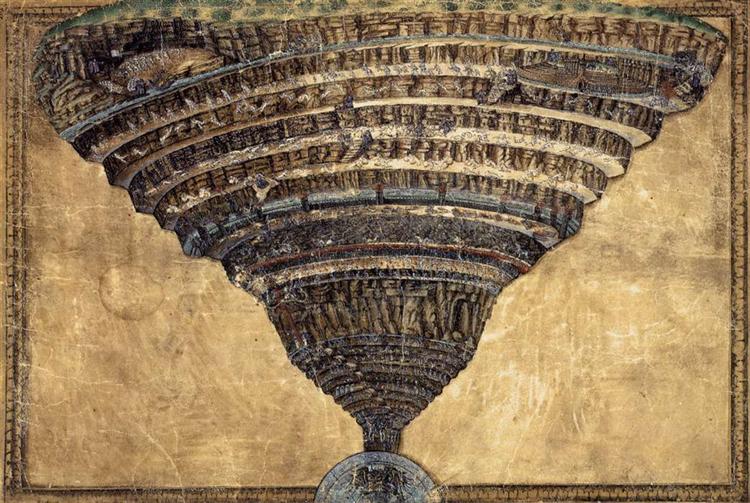Description
Sandro Botticelli's painting "The Abyss of Hell" (1480) stands as a fascinating work that reflects both the Florentine artist's virtuosity and the spiritual and philosophical concerns of his time. This painting, loaded with symbolism and meticulous detail, stands at the intersection of Renaissance art and medieval tradition, offering a powerful and often disturbing vision of hell, as it was conceived in the literature and theology of the previous periods.
Compositionally, the work presents a pyramidal structure that concentrates the viewer’s attention on the central abyss, a dark pit that seems to devour the light. This abyss, more than just a physical space, suggests a deep and distressing uncertainty about human morality and its consequences. The layers of figures, arranged in such a way as to guide the gaze from the vibrant voice of the condemned on the surface to the dark void, invite the viewer to an introspective dialogue about sin, redemption and punishment.
As for the colour palette, Botticelli deploys a combination of sombre tones alongside more vibrant accents. The dark colours of the abyss contrast sharply with the more vivid hues of the figures grouped above, creating a dramatic effect and a sense of tension. This use of colour not only emphasises the duality between heaven and hell, but also reflects the emotional state of the characters, who seem caught in a moment of despair and horror.
The characters that populate the surface of the painting are equally intriguing. Figures are seen in various attitudes, some appearing blessed while others are clearly being dragged towards doom. Each figure is depicted with a remarkable degree of individuality, suggesting that Botticelli is concerned with depicting the human experience in its entirety, from despair to hope. The iconography that emanates from this work evokes memories of Dante and his "Divine Comedy," a text that, although not explicitly referenced, resonates in the depiction of punishment and salvation.
Throughout history, Botticelli has been recognized not only for his sublime technique, but also for his ability to weave complex narratives into a single image. The Abyss of Hell is therefore an example of the ingenuity of an artist who, while influenced by the aesthetics of Neoplatonism, did not renounce the exploration of dark themes. This painting, often underrated in comparison to his more celebrated works such as The Birth of Venus, confronts us with a Botticelli who invites us to reflect on the human condition, sin and eternal suffering.
The painting, though lesser known, is a testament to the critical thinking of its time and to the fact that, for Botticelli, art was not only a means of beauty, but also a tool of moral contemplation. In his exploration of hell, the artist offers us a mirror in which we can observe not only the anguish of the damned, but also the echoes of our own decisions and the inescapable search for meaning. In doing so, The Abyss of Hell becomes a melting pot of ideas, emotions and a complexity that transcends its time, while maintaining its relevance for the contemporary viewer.
KUADROS ©, a famous painting on your wall.
Hand-made oil painting reproductions, with the quality of professional artists and the distinctive seal of KUADROS ©.
Painting reproduction service with satisfaction guarantee. If you are not completely satisfied with the replica of your painting, we will refund 100% of your money.

